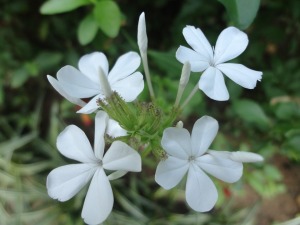 Jasmine is a popular plant with wonderfully fragrant flowers. It’s native to the warmer parts of Europe, the Middle East, Central Asia, the Far East and Oceania. The white or yellow flowers have some uses in medicine and aromatherapy, particularly in South Asia and China.
Jasmine is a popular plant with wonderfully fragrant flowers. It’s native to the warmer parts of Europe, the Middle East, Central Asia, the Far East and Oceania. The white or yellow flowers have some uses in medicine and aromatherapy, particularly in South Asia and China.
There are more than 200 species of jasmine, including both climbing vines and shrubs. Two types popular in the Middle East are common jasmine (Jasminum officinale) and Arabian jasmine or al-full (Jasminum sambac). Arabian jasmine is the national flower of the Philippines and Indonesia.
Jasmine is a popular essential oil in aromatherapy. It has a strong, sweet fragrance, which is very common in flowers that bloom only at night. It promotes relaxation and, some say, mental alertness.
As the “Home Remedies for You” website describes it, jasmine has a number of medicinal uses:
Whether it is a jasmine flower or essential jasmine oil, jasmine can be used as an aphrodisiac, a sedative, an antiseptic, antidepressant, antispasmodic, and analgesic. In Ayurveda, jasmine has been used as an aphrodisiac and as a means to increase immunity and fight fever. It has also been regarded as a means to treat conjunctivitis. In traditional Chinese medicine, jasmine flowers are brewed and consumed as an herbal and remedial tea. An infusion of jasmine tea is known to be beneficial in treating fevers, urinary inflammation, and other infections. In addition, jasmine tea can be helpful in relieving stress and anxiety. It can be extremely helpful for people suffering from heat stroke or sunstroke.
Jasmine tea can also be administered as a tincture to treat cuts and scrapes. A compress using jasmine flowers can be useful for headaches and strokes. Jasmine juice is useful for treating corns. In fact, various skin conditions including sun burn and rashes can be treated by apply jasmine in lotion form. Jasmine oil is an integral part of aromatherapy. It is used in the form of incense, candles, and jasmine body oil, providing several benefits including uplifting the mood. The scent of jasmine is said to be useful in treating depression, in particular post partum depression and emotional depression. A body massage with jasmine oil is known to not only lift spirits but also relieve aches and pains.
However, the “Natural Remedies” website cautions:
Over the centuries, jasmine has acquired a veritable corpus of mythological beliefs. Some of these allegations, like the statement that jasmine green tea has spiritual benefits to the drinker, may never be able to be tested properly.
Although many people have reported experiential benefits from consuming jasmine in some form, many of these claims have not been tested. New users must remain cautious and approach using jasmine with an attitude of respectful curiosity. Jasmine may trigger allergic reactions in some people; the full extent to which this is possible has not yet been explored.
Among the spiritual beliefs linked to jasmine, there is the conviction in some parts of the Muslim world that the jinn, or genies – spiritual beings said to interact with the human world – are attracted by the plant’s heady and perhaps intoxicating fragrance. For example, India’s The Statesman recently carried a review of Jasmine and Jinns, a cookbook/memoir by Sadia Dehvi:
Are Jinns (Djinns) attracted to jasmine, the much celebrated flower that women love to adorn their hairdo with? According to author Sadia Dehlvi, mothers and grandmothers in the olden days forbade unmarried girls from scenting their bed with jasmine because the Jinns were so fond of it that they fell in love with them.
Sadia has made this the title of her new book, Jasmine and Jinns (Harper Collins). It may be a far-fetched title for book of mainly non-vegetarian recipes and family history but perhaps given in the hope that it would attract readers too (despite its high price of Rs 699 for just 211 pages). In this connection one remembers another belief: that girls shouldn’t walk on the terrace at dusk with hair open after a bath as Jinns, the invincible beings created from fire, took possession of them and they pined away under their influence.
A perfect plant for future investigation…
Learn more Home Remedies Tips of Patanjali: https://newpatanjaliproduct.blogspot.in/